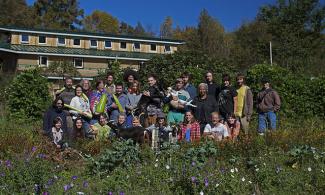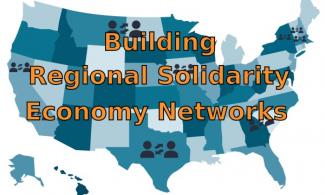
by Jessica Gordon Nembhard
In 2011 GEO called together worker cooperative developers and supporters to discuss “Advancing the Development of Worker Cooperatives” (ADWC). We conducted an online forum through our website, and organized a one-day conference to kick off the 2011 Eastern Conference For workplace Democracy (ECWD) in Baltimore. Sojourner-Douglass College hosted our pre-conference on July 7, 2011. We put together GEO Issue #8 Volume 2 (http://www.geo.coop/vol-2/issue-8) “Worker Cooperative Development Models,” to report on the dialogue and highlight a variety of development models and issues before the conference. The pre-conference spurred conversation not only throughout the rest of the ECWD 2011 but also at the Western Worker Co-op Conference that fall and the US Federation of Worker Cooperatives Conference in Boston in June 2012.
For 2013, we are holding another ADWC, co-sponsored by GEO, ECWD and Mariposa Food Co-op in Philadelphia, on July 26, 2013. This time the focus is on exploring strategies for self-financing of worker co-ops and inter-cooperative approaches for financing worker co-ops – i.e., on friendly financing within the Movement and a co-op’s supportive community. The invitees are worker co-op members themselves more than developers, though developers are of course welcome and their expertise and perspective are an important part of this discussion. This issue focuses on the various models of self- and inter-cooperative financing and how they operate. The conference will focus on discussions of their strengths and weaknesses, implementation and taking some of these models to scale, etc. – i.e. best strategies and practices and how we as a movement can best address financing new and existing worker co-operatives.
Why is finance important to worker cooperatives (and co-ops in general)? As much as we love co-ops as associations that develop and practice relationship building, democratic participation, and positive social capital, co-ops are also businesses. In order to maintain themselves, sustain, survive and prosper they need appropriate financing that meets their unique needs and helps them to start up and thrive in ways that promote both the business aspects as well as the democratic and associational aspects. This can be tricky. Members need to all be able to understand the financing, read the spreadsheets and participate in financial decision-making and financial critical thinking. These are often not skills people bring to a cooperative. Another goal of this meeting is to help co-op members see the importance of not only discussing finances, and understanding financial options for the co-op, but also being involved in thinking about the financial options and thinking innovatively about financing. In this issue you will find descriptions of a variety of strategies for financing worker cooperatives, that reflect some or all of the seven cooperative principles (open membership, autonomy, limited return to capital, one person one vote, continuous education, cooperation among cooperatives, concern for community; see www.ica.coop); and whose goals are to help worker cooperatives raise money in ways that will help the co-op thrive, and will not obligate the co-op to de-emphasize ownership culture, change the nature of their governance practices or in any other way compromise the co-op principles and values.
We asked all the presenters and potential presenters for the July 2013 conference to provide written descriptions of their strategy/model of financing and to answer the following questions:
- What are the impacts to date of this example?
- How has cooperative development happened in this example?
- How was start up or growth financing obtained in this example?
- To what extent is this example cross-sector? What are the resulting benefits and challenges?
- To what extent does this example fit or not fit in to this strategy category?
- What are the strengths & weaknesses of this strategy?
- In what situations is this strategy most and lease appropriate?
We want these written pieces to provide information and background for anyone interested in this topic but also for conference attendees so that presenters can focus their oral presentations on reflective comments and dialogue about the strengths and weaknesses and how to bring some of these strategies to scale, rather than using our face to face time on learning the details of these models. We hope that all participants will read this issue before the July 26th conference/meeting. We also hope that our readers who cannot attend the pre-conference also find this interesting and worth reading. GEO readers can log in and comment on the issue or on a specific article and keep this dialogue going.
As you read the following articles and/or attend the ADWC 2013 we want you to reflect on the following questions and suggest your own:
- What other examples of inter-cooperative financing do we know of that might fit into this strategy?
- Does anyone have new ideas for tactics related to this strategy?
- What would be the impacts of growing this strategy?
- What challenges do you foresee with implementation of this strategy?
- Do we think this is a strategy worth pursuing/growing?
- If so, how could it be brought to scale?
- How can this strategy be tweaked to address other/more/different needs?
- Are there similar strategies or practices that apply; or what other innovative financing strategies do you know of or are you thinking of?
You can now access the first seven (7) articles in this issue. Adam Trott, of Valley Alliance of Worker Co-operatives, writes in "Co-ops Financing Co-ops: Worker co-ops run their own businesses, why not their own financial resources?" that financial institutions do not understand co-ops. VAWC has started their own loan fund to help fund worker co-op development and worker co-op advancement. Micha Josephy ("The Cooperative Fund of New England") describes Cooperative Fund of New England's origins, goals, lending practices and accomplishments especially in terms of their support for worker co-ops. In "Democracy at Work Network and Kiva Zip," Jessie Myszka details DAWN's role as a trustee for Kiva's micro finance direct micro-lending pilot program for members of worker co-ops. Esteban Kelly provides a comprehensive discussion of the search for friendly affordable financing and the innovative approaches Mariposa Food Co-op has used, particularly with community support ("From Crowd Sourcing to Direct Investment: Co-op to Co-op Solutions to grow Our Democratic Businesses"). Our fifth article highlights the new efforts done by and through Working World ("The Working World and Financing Workplace Democracy") to get solidarity financing to work for worker cooperatives and co-ops. In “From Mondragon Networking to Franchising: The Arizmendi Association Model of Financing,” Tim Huet provides us with specific details about how the Arizmendi Association of Cooperatives handles financing, especially using an innovative franchising variation and a surplus-based fee formula, to meet their goal of building an engine for accelerating cooperative growth. The seventh article comes from our friends in Canada, Eric Tusz-King of the Canadian Worker Co-operatives Federation (CWCF) provides a comprehensive overview of various financing models used in Canada, particularly in Quebec, and through the CWCF; including links to other articles (“Building Upon Self-Financing: Practices in Canada”).
This issue is part of GEO's new practice to post "Issues" of 4 to 8 articles all related to a similar theme once we have at least 4 articles ready. We make sure the first articles in the issue are made available to the readers and pull them together with an introduction to the theme. As other articles come in, and as readers submit articles in reaction to what has already been posted, we will continually add to the issue for the next 6 to 12 months (and keep the introduction up to date). So keep tuning in, we will have more articles on this subject. Also feel free to submit an article yourself or propose on article on this subject; and/or to comment on any of these articles. We want this to be an interactive dialogue. If you sign into GEO's website, you can chat about this issue, or any of the issues, and even post gleanings (short current events announcements or discussions) from the privacy of your own home. We encourage you to interact with us and the authors, to come to the ADWC2013 in Philadelphia if you can (see www.east.usworker.coop), and to keep the dialogue going on these important issues.
Thanks for your readership and support of GEO. See you in Philadelphia in July.
(Editor's Postscript: At the ADWC, the Valley Alliance of Worker Co-ops (VAWC) was honored for their work in regional organizing and co-operative funding. GEO has posted the Preface to a key study documenting the work and thinking that helped VAWC evolve: "The Valley Alliance of Worker Co-operatives: Exploring the Potential of Co-op Led Development". There was a recent Web article with an embedded video titled Financing the New Family Farm that has great relevance to this theme as well.)




